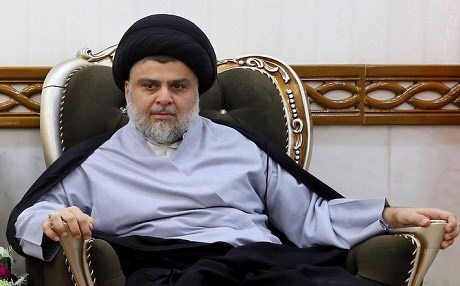 Muqtada Al-Sadr: Iraq’s premier political player
Muqtada Al-Sadr: Iraq’s premier political playerBy Farhad Alaaldin 28/10/2018
Since the announcement of election results in May, Muqtada al-Sadr has emerged as the leading post-election player, taking over from Nuri al-Maliki who had always been at the head of post-election negotiations and political maneuvering.
Muqtada al-Sadr stamped his authority over the process of negotiations from the start and sustained it throughout. He started with holding talks with all the major political parties in June and July, and then formed a new coalition (al-Eslah and al-Emaar). He lead the coalition from the outset despite the fact that it included some of the biggest names in Iraqi politics, including Ammar al-Hakim, Haider al-Abadi, Ayad Allawi, and Osama al-Nujaifi, among others.
Perhaps the press conference that was held in Babylon Hotel on September 23 by Sadr's young representative Ahmed al-Sadr who read a statement, with all the leading figures of the coalition standing behind him, was a clear illustration of Sadr's authority over the other big guns and coalition partners.
Thereafter he moved on to make sure he is the one who appoints the prime minister. Al-Eslah squabbled openly and privately with al-Binaa bloc (led by Hadi al-Ameri) for several weeks over who is the largest bloc. Both tried to win the smaller political parties; however, the race ended once Sadr and Ameri agreed on nominating the same person as PM designate, namely Adil Abdul-Mahdi.
This agreement came about after the Basra unrest and burning of the Iranian consulate. The political parties felt the urgency and gravity of the situation, they sensed that matters such as the largest bloc are petty compared to the overall danger they are facing collectively, and realized that if matters get out of hand in Basra and other provinces, they would lose more than just naming the PM.
Additionally Sadr and Ameri aligned because of a desire to stop the Islamic Dawa Party holding the Premiership for another term, their tight grip on that post has gone on for too long and this was their golden opportunity.
Sadr declared his victory in a tweet on October 26. Observers agree he is a completely different political player than what he used to be; he has emerged as a force to be reckoned with and has many more tools at his disposal to stamp his authority.
As examples:
— He used his popularity at the grass root level to put pressure on political parties. They all agreed that they could not ignore Sadr or form a new government without his participation,
— He used savvy maneuvering to make sure he is in the heart of the government formation, his representative, Sheikh Waleed al-Kremawi, was the leading negotiator in AAM's team, calling most of the shots when it came to ministerial distribution.
— He used his parliamentary block inside the parliament to sway the voting and the proceedings during the voting session. They managed to effectively install Abdul-Mahdi as PM, and prevent opponents from taking their post in the interior minister. Sayirun first used the pretext of lack of information about candidates' background, yet they were fully involved in the shortlisting process through their candidate in Abdul-Mahdi’s team. They stopped the proceedings and asked for a 30 minute recess, only to comeback and distribute 14 of 22 ministries. This can only be regarded as a master stroke of parliamentary manipulation.
— He used Twitter to its maximum effect, portraying himself as the person who is calling the shots, and got what he wanted most of the time. To this end, he prevented any current members of parliament to take ministerial positions or any previous ministers to be re-appointed in Abdul-Mahdi’s cabinet
— He adopted a winning formula to form the new government, his party has no ministers in the cabinet, yet he is seen as the person behind the formation of this new government. If Abdul-Mahdi succeed in his mission, Sadr would take plenty of credit for it; however, if he runs into trouble, Sadr would walk away and become opposition. Either way he can maneuver into a good position without losing political credit.
Farhad Alaaldin is an advisor to the Iraqi president.
The views expressed in this article are those of the author and do not necessarily reflect the position of Rudaw.
No comments:
Post a Comment